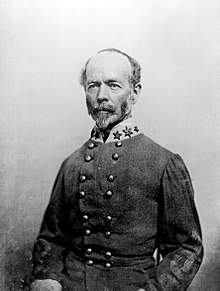Joseph E. Johnston
| Joseph Eggleston Johnston | |
|---|---|

Johnston during the American Civil War
|
|
| Nickname(s) | "Joe" |
| Born |
February 3, 1807 Farmville, Virginia |
| Died | March 21, 1891 (aged 84) Washington, D.C. |
| Buried at | Green Mount Cemetery, Baltimore, Maryland |
| Allegiance |
United States of America (1829–1861) Confederate States of America (1861–1865) |
| Service/branch |
United States Army Confederate States Army |
| Years of service | 1829–1865 |
| Rank | |
| Commands held |
|
| Battles/wars | |
| Other work | Member of the U.S. House of Representatives from Virginia's 3rd district |
Seminole Wars
American Civil War
Joseph Eggleston Johnston (February 3, 1807 – March 21, 1891) was a career U.S. Army officer, serving with distinction in the Mexican-American War and Seminole Wars, and was also one of the most senior general officers in the Confederate States Army during the American Civil War. He was unrelated to Albert Sidney Johnston, another high-ranking Confederate general during the Civil war.
Johnston was trained as a civil engineer at the U.S. Military Academy, graduating in the same class as Robert E. Lee. He served in Florida, Texas, and Kansas, and fought with distinction in the Mexican-American War and by 1860 achieved the rank of brigadier general as Quartermaster General of the U.S. Army. When his native state of Virginia declared secession from the Union, Johnston resigned his U.S. commission and became the highest-ranking U.S. officer to join the Confederacy. To his dismay, however, he was appointed only the fourth ranking full general in the Confederate army.
Johnston's effectiveness in the American Civil War was undercut by tensions with Confederate president Jefferson Davis, who often criticized him for a lack of aggressiveness, and victory eluded him in most campaigns he personally commanded. However, he was the senior Confederate commander at the First Battle of Bull Run in 1861, and his recognition of the important necessary actions, and prompt application of leadership in that victory is usually credited to his subordinate, P.G.T. Beauregard. He defended the Confederate capital of Richmond, Virginia, during the 1862 Peninsula Campaign, withdrawing under the pressure of a superior force under Union Maj. Gen. George B. McClellan. In his only offensive action during the campaign, he suffered a severe wound at the Battle of Seven Pines, after which he was replaced in command by his classmate at West Point, Robert E. Lee.
...
Wikipedia
